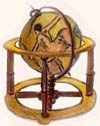 |
|
"The admission of the null set into the canonized definition of rhyme would expand poetics incalculably."
|
Rhyme or Not ___by Dan Waber Let me begin by saying that I don't expect to make any friends as a result of this essay. If the poetry world is divided into two camps--those who rhyme, and those who don't--I am about to make a case for a concept that will alienate me from both. The Premise: Words can rhyme with zero phonological similarities. The Explanation: Every definition of rhyme that exists describes it as a function of sound similarity. More detailed definitions will admit that there is a cognitive aspect of rhyme that is integral, but secondary to the aspect of sound. No one is willing to allow for rhyme to exist without some half or shadow or echo of sound similarity. The world used to be flat, too. Example (from The New Princeton Encyclopedia of Poetry and Poetics, definition of Rhyme, under II. Taxonomy): If we ask which elements of a syllable can be repeated in a second syllable in correspondence with the first, letting underlining denote a sound repeated identically, then seven configurations are possible (the eighth possibility is null; these are simply the permutations of a set of three elements, having these forms and Eng. names: My father told me once, "Never use an analogy unless you are prepared to be beaten over the head with the ramifications you overlooked." The null set is an accepted member of the set of permutations of any three elements everywhere else, why not here? It is curious that it even gets a mention, only to be dismissed out of hand. Why bring it up only to say it means nothing? Certainly not for lack of examples or historic precedent. Further on in this very definition (IV. Analogues), we hear of Milton who "also weights words at line end (Broadbent calls this "anti-r."), counterposing semantically heavy and contrastive terms at PL 4.561-62, for example: "Tempt not the Lord thy God, he said and stood. / But Satan smitten with amazement fell"". This is the null set in action. The Reason It Works: Line end is sufficient to produce expectation/identification of rhyme. Otherwise, Roses are red,wouldn't be funny. In traditional verse forms, the form itself adds to the signs pointing to the rhyme. If it looks like a Spencerian stanza: Tick tick clock drip drip drop no no not me (a)and the words at line end have a valid semantic relationship, then the words do all the work of rhyme and deserve the title. The Value: The admission of the null set into the canonized definition of rhyme would expand poetics incalculably. By accepting that line end and/or traditional verse structure is sufficient to indicate rhyme, the poet gains the ability to hammer together words that have never been hammered together before. Easy null set rhymes would pair words that are obviously related. Truly successful null set rhymes will result from the poet's new ability to say, "These words are related because I say they are." Now that's some serious artistic firepower. It would give the rhymers the freedom of language the non-rhymers boast of, and would allow the traditional verse forms employed by the rhymers to be adopted by the non-rhymers. Allowing null set rhyme could also help solve some of the difficulties of translation, where the cementing of rhyme is called for but the differences between languages do not allow satisfactory word selections. The Drawback: Who will we pick apart and lambaste in the coffee shops? There's always those concrete poets, I suppose. How To Bring It About: First, we need a better name. Null set won’t cut it, and neither will anti-rhyme. I'm going to start calling it cognitive rhyme, so, if you've got a better name (devoid of swear words), you're going to need to tell more people than I do if you want to win. Second, try it out. The best way to prove me wrong is to try it and then not like it. I'm betting that once you find a poem
that requires it, you'll start telling people you thought of it first.
|
||
